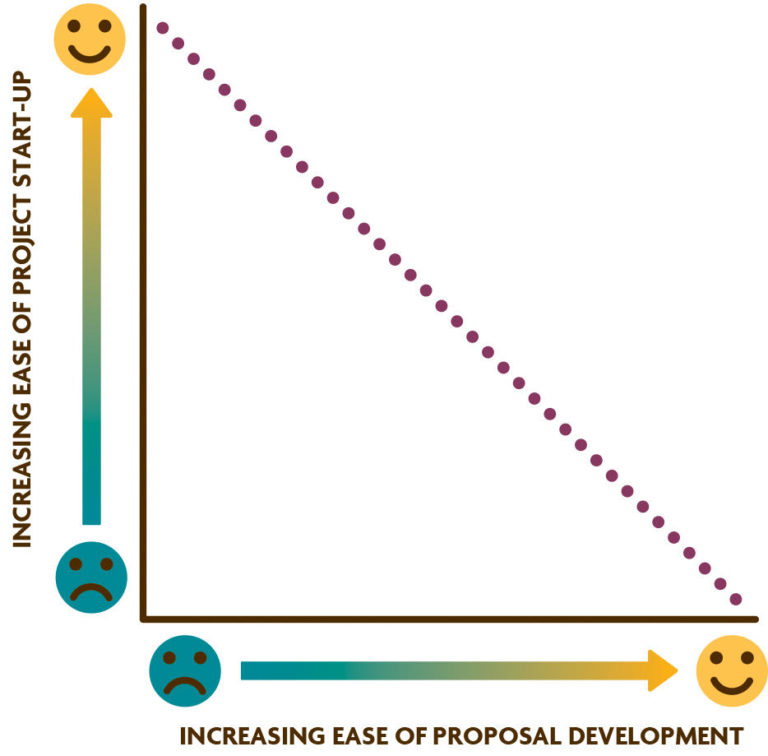The transition from a potential project to one that is successfully implemented requires diligent application of participatory principles. During this start-up phase, the team will revisit the proposal plan and revise it as needed to move into execution. Once funding has been obtained, the team is committed to a collaborative endeavor that will be part of each member’s work life for the next few years. It is not surprising that the moment of success is often mixed with conflict and stress. During this transition, many newly formed teams encounter the “storming” phase of team development as described by Tuckman (1965) and discussed in chapters 2 and 3.
Frequently, groups that experienced smooth proposal development will now find that more extensive planning and team development is needed before project implementation can begin (Figure 5.1). Two dynamics contribute to this pattern. First, during the early stages of team development, group members are more likely to defer to the project leader or acquiesce to the dominant viewpoint without voicing divergent opinions (Wheelan, 1994). Second, fully integrating members’ diverse perspectives requires more time than was needed during the conceptual stage.

Confirming the Plan and Launching the Project
Upon receiving news of a grant award, begin by confirming the agreements made during the proposal-writing stage and by carrying out a more detailed planning phase. Depending on how long it has been since the proposal was written, changes in circumstance may have occurred that affect the budget, project activities or individual collaborators. The team may find details that were not addressed during the initial stages and that must be resolved to implement the project. If proposal reviewers identified concerns or made recommendations, consider these items carefully; they may improve the project, even if changes are not required by the funder.
Consider the following questions at this stage:
- Does the conceptual model adequately describe the system? Check that each collaborator can pinpoint their location within the conceptual model and that farm operator members can validate the system model. Are all important processes included and are there clear boundaries?
- Are the questions outlined in the proposal still germane? Have there been any significant changes or discoveries since the proposal was written? Do the questions need to be updated? Do the system-level hypotheses still make sense to the farmers?
- How well is the decision-making structure working? Evaluate the decision-making process that occurred during the proposal writing stage. Now that your team is shifting from project development to implementation, how will it make different kinds of decisions? The team may decide to restructure to better fit the implementation phase. For example, if there are more than four to five collaborators, consider reorganizing into subgroups with differing responsibilities.
- Is the budget allocated appropriately? Deal with this issue swiftly so the grant contract can be processed. Consider whether there have been any major changes since writing the proposal that would affect the budget. For example, have any collaborators received funding for components that overlap with the larger project? Have there been any significant increases (or decreases) in the costs of budgeted items? If the project was funded at a reduced level, several approaches can be used to reallocate funds. These are discussed under financial management later in this chapter.
- Can all team members still take on their commitments and tasks as planned? Check that each collaborator is still committed to their plan of work. Ask each person whether any changes in circumstances have occurred that might make it difficult to follow through with their commitments to the project.
- Is the timeline confirmed, or does it need to be revised? Most proposals require a timeline for key tasks. Check whether everyone is in agreement with the timeline. Confirm that agreements are in place for meeting project objectives.
As a team, carefully consider how much planning will be needed to begin implementation, and allocate time for this. The planning period can require anywhere from two to eight months, depending on the size and complexity of the project and the degree of plan modification that is needed. Organize hiring of staff and graduate students to coincide with the time when project activities will be carried out.
